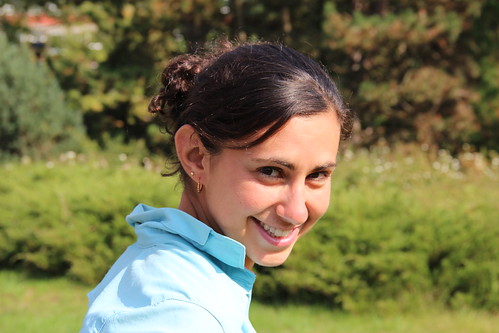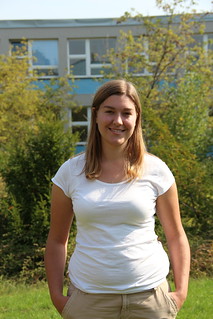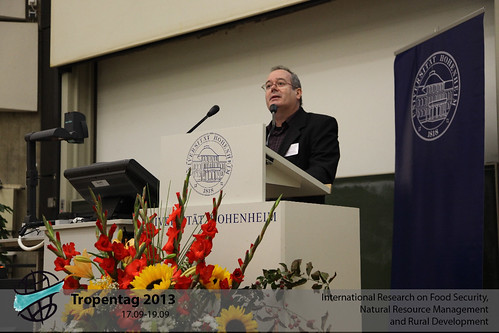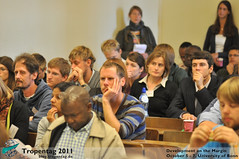adaptation
Rachel, Student Reporter 2014–"Translating technical findings for practitioners"
Tue, 09/16/2014 - 13:01 — Pramila Thapa
Rachel Friedman, with a first degree in environment science and masters in science communication, has a passion for translating technical findings for development practitioners and the general public. With experience in blogging and social media, she is excited to report on the research presented at the Tropentag conference 2014, Prague.


Birgit Zipf, Student Reporter—Let's talk directly, across borders
Tue, 09/16/2014 - 12:34 — Helen Sitar When discussing challenges in tropical agriculture, is it actually necessary to talk to researchers from the tropics? Birgit Zipf, second-year student reporter for the Tropentag 2014 conference, certainly believes so! She's tired of attending conferences where German, British, and American presenters are “talking about the ‘others’” from developing regions, instead of inviting and “rather talking with them.” But why is this distinction particularly important to Birgit?
(Continue...)
When discussing challenges in tropical agriculture, is it actually necessary to talk to researchers from the tropics? Birgit Zipf, second-year student reporter for the Tropentag 2014 conference, certainly believes so! She's tired of attending conferences where German, British, and American presenters are “talking about the ‘others’” from developing regions, instead of inviting and “rather talking with them.” But why is this distinction particularly important to Birgit?
(Continue...)
Climate Change versus Evolution: A threat to Plant Production Systems?
Thu, 09/19/2013 - 13:15 — Pamella Ogada
Session: Plant Production Systems within the rural-urban continuum
Chair: Anthony Whitbread, Georg-August-Universität Göttingen, Germany
With the ever rising effects of climate change, adaptation of crops and advanced scientific research at genetic levels, are facing major challenges due to the segregation effect on the unstable crop genotypes.
The session of Plant Production systems covered a broad area dealing mainly with agricultural production, from crop protection aspects to crop modeling to combat climate change, with the aim of creating a sustainable agricultural system.
The lead paper, by Manuel Tamo, an insect ecologist from the International Institute of Tropical Agriculture (IITA), presented a crop protection aspect specifically focusing on Biological Control.
 Manuele Tamo, International Institute of Tropical Agriculture (IITA), Benin.
Manuele Tamo, International Institute of Tropical Agriculture (IITA), Benin.
 Manuele Tamo, International Institute of Tropical Agriculture (IITA), Benin.
Manuele Tamo, International Institute of Tropical Agriculture (IITA), Benin.
Climate Change: still getting hot!
Fri, 10/07/2011 - 12:45 — De-Registered User Nowadays, discussions about climate change are almost a guaranteed part of any scientific or academic forum. Tropentag 2011 is no exception. It is not only that climate change had one thematic session and two posters sessions dedicated to it, but the topic was constantly mentioned in other sessions such as Food Security, Ecosystem Services, Soil Fertility, Crop Production, Water and Irrigation, and Forests. I am not implying that climate change is THE ISSUE, but it seems clear that it was one of the key issues connecting the theme of marginality.
If you follow the “whereabouts” of climate change (as I do!), you won’t be surprise to hear that nothing really new came out the Tropentag 2011. Don’t get me wrong, there were lots of useful new data, nice climatic models, experimental results and adaptation activities; but they were in most cases, an improved version of what we saw in previous gatherings dealing with the issue -nothing really new-.
Where the heat comes from?
I was actually surprised to see that during the thematic session, the large lecture room was overflowing with people. It was probably the most attended session apart from the plenary session on Wednesday 6 October, clearly indicating that visitors to Tropentag 2011 considered climate change as one of the hottest issues at the conference.
Nowadays, discussions about climate change are almost a guaranteed part of any scientific or academic forum. Tropentag 2011 is no exception. It is not only that climate change had one thematic session and two posters sessions dedicated to it, but the topic was constantly mentioned in other sessions such as Food Security, Ecosystem Services, Soil Fertility, Crop Production, Water and Irrigation, and Forests. I am not implying that climate change is THE ISSUE, but it seems clear that it was one of the key issues connecting the theme of marginality.
If you follow the “whereabouts” of climate change (as I do!), you won’t be surprise to hear that nothing really new came out the Tropentag 2011. Don’t get me wrong, there were lots of useful new data, nice climatic models, experimental results and adaptation activities; but they were in most cases, an improved version of what we saw in previous gatherings dealing with the issue -nothing really new-.
Where the heat comes from?
I was actually surprised to see that during the thematic session, the large lecture room was overflowing with people. It was probably the most attended session apart from the plenary session on Wednesday 6 October, clearly indicating that visitors to Tropentag 2011 considered climate change as one of the hottest issues at the conference.
Oral Presentations II: Genetic Diversity
Wed, 09/15/2010 - 17:57 — De-Registered User
This is a flavour of one of the six presentations that occurred in the Genetic Resources Oral Presentations on Wednesday, September 15th.
Genetic Diversity and Adaptation of Date Palm (Pheonix dactylifera L.) – Sakina Elshibli
The date palm produces sugar rich fruits which are cultivated in arid areas of the world. One kilogram of dates produces approximately 3000 calories. Palm dates also contain a wide range of nutrients, vitamins, and amino acids. The date palm can tolerate drought, but when the fruit is cultivated irrigation is needed.
Date palms are useful because they provide small microclimates through shade. They also have a wide range of social and economic values, such as a housing material. This is especially true in Sudan where this study was carried out.
There is an apparent diversity of date palms (fruit shape, side leaf structure, and morphology stages.) Dates are usually divided into two groups: dry and soft. In Sudan there is no genetic characterization of morphological variability in date palms. Over past twenty years production has increased, however stresses have also increased. These stresses include: floods, spread of diseases, desertification, and drought.
Propagation is also a main constraint to increased cultivation. Date palm seeds are not suitable for cloning. It is only possible for few cultivars to be cloned, leading to date palm monocultures. A high percentage of off-types increase the risk of contamination for traditional cultivars.




